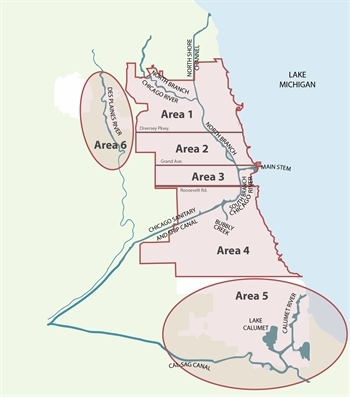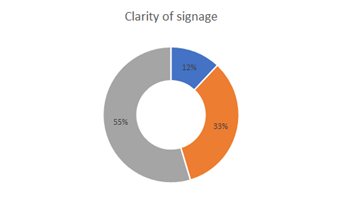
West Town Bikes interns Jamal and Coby walk near the Chicago River at The Garden, a series of dirt bike trails nestled in Clark Park on the city's Northwest Side.
MPC is building a new long-term vision for the Chicago, Calumet and Des Plaines rivers in the city. Earlier this year we used a survey to gather input from Chicagoans (both residents and visitors) about their thoughts on the rivers. We collected over 3,700 responses and just about a third of those responses were based on what we are referring to as "Zone 1," the stretch of the Chicago River that spans from Diversey to the Northern limits of Chicago.

Our survey for Great Rivers Chicago broke all of Chicago's rivers into six different areas, or "zones."
Biking came up quite a bit in our survey results so we connected with West Town Bikes, an organization that promotes bicycling in Chicago with a particular focus on youth and underserved communities, to get their thoughts on biking along the river.
This summer, for the first time ever, West Town Bikes hosted a group of dedicated young bicyclists thinking like urban planners to come up with ideal bike routes between three key cycling destinations in Chicago: The 606, The Garden and the Logan Blvd. Skate Park. It was the perfect time to meet up with them to talk about Great Rivers Chicago and get their thoughts on Chicago’s rivers.
These enterprising high-schoolers have dedicated part of their summer to developing a set of recommendations for the Mayor’s Bicycle Advisory Council in December. Since this group of young cyclists are always on the move through the city, we thought they would have some valuable input on how to make Chicago’s riverfront more attractive to people like them.
We met at The Garden, a hidden series of dirt bike jump trails. It’s right along the river, in Clark Park on the city’s Northwest Side, so it was the perfect place to meet to talk about biking along the river. I met with four summer interns: Jamal, Cynthia, Juan and Coby. Two of them are heading off to college in the fall. They all use their bikes as their primary means of transportation to get around Chicago because it’s fun and affordable.
I asked them to tell me about their project and they said they’d learned a lot about the data associated with riding in the city. Though two of them have been in serious bike crashes themselves, they were all shocked by the number of crashes happening in Chicago. They are all eager to weigh in on how to make biking safer and hope for more dedicated bike lanes and paths. The key to safer biking in Chicago, in their minds, is more signage, social acceptance of biking and greater access so that cyclists feel that they belong everywhere throughout the city.
How can we make Chicago’s rivers attractive to young cyclists?
Even though we were on the river, the West Town Bikes interns didn’t give it much thought. I asked them to describe where we were and the river wasn’t part of their description, despite it being in plain sight. When I asked them what came to mind when they think about the river, they shared the sentiment that we heard quite frequently through our Great Chicago River’s survey: “dirty, gross and smelly.” Cynthia, a native Chicagoan, said she didn’t even realize that we had a river here in Chicago. She always thought that the body of water we were standing by was part of the lake because no one ever really talks about the Chicago River.
These students aren’t the only ones who feel this way. In a recent survey of more than 3,700 respondents, the Metropolitan Planning Council found that the word most commonly used to describe today's rivers is "dirty." The top five words that people wanted to have associated with the future of Chicago’s rivers were: clean, easy to get to, parks, exercise and active. And of the large group of respondents, only 8 percent of survey respondents were under the age of 25.

In Zone 1, 55 percent of survey respondents rated clarity of signage along the river as "poor," 33 percent as "fair" and 12 percent as "good."
This stretch of the Chicago River North Branch has lots of room for improvement to attract younger visitors. Here are a few tips from the West Town Bikes interns on what changes would bring them to the river, a place they never ever think to go hang out in their free time:
- The river needs to be more attractive and clean.
- More signage is needed to direct people to go to the river.
- A continuous path along the riverfront would make it easier to access.
All of this feedback aligned well with our survey results for Zone 1.
If you would like to give us your input and haven't had a chance yet, we are hosting the final two of four community meetings on Wednesday, Oct. 28, at Ping Tom Memorial Park and Wednesday, Nov. 4, at REI, 1446 N. Halsted St. The meetings run from 6:30 to 8 p.m. and are open-house style; come for 15 minutes or the whole hour and a half and give us your input for the future of our rivers!
Many thanks to Emily Leidenfrost, program manager at West Town Bikes, and Chad Rispalje, lead producer of Free Spirit Media, for coordinating this visit and capturing it on film, respectively.